★★
“Left feeling quite Cheetah’d…”
 Before COVID-19 hit, this was scheduled to be the year’s biggest action heroine movie. Originally slated for a June release, it was the sequel to a film which earned a well-deserved $800+ million worldwide, and a similar return seemed within reach. But its opening was first delayed, and then it was announced the movie would only get a limited release, coming out in North America on HBO’s streaming service, HBO Max. Difficult times. But the sad fact is, this feels more like a contractual cash-grab. Even with the same star and director, it seems sadly lacking in genuine, emotional heart.
Before COVID-19 hit, this was scheduled to be the year’s biggest action heroine movie. Originally slated for a June release, it was the sequel to a film which earned a well-deserved $800+ million worldwide, and a similar return seemed within reach. But its opening was first delayed, and then it was announced the movie would only get a limited release, coming out in North America on HBO’s streaming service, HBO Max. Difficult times. But the sad fact is, this feels more like a contractual cash-grab. Even with the same star and director, it seems sadly lacking in genuine, emotional heart.
There are quite a few other problems. Firstly, this is set in 1984, because… Well, there’s no real reason. At least Captain Marvel gave us a fight in a Blockbuster Video store. Here, the period flavour seems limited to one Frankie Goes to Hollywood song, randomly dropped in at a party. Otherwise, it could easily be set now. Another issue is the sheer length. This is 151 minutes: that’s only 10 minutes longer than its predecessor, but it feels a lot more. Part of this may be because after the opening, you then have to wait for over an hour, before there is any further significant action. While I’ve not pulled out a stopwatch, the ratio of that to talk overall just seems considerably worse.
Then we have the plot, which centres on a magic hunk of rock, the Dreamstone, that grants one wish to anyone who touches it. Diana Prince (Gadot) naturally wishes for the return of dead lover, Steve Trevor (Pine). Mousy work colleague Barbara Ann Minerva (Wiig) wishes to be like Prince, a process which ends up turning her into supervillainess Cheetah. And eventually gives her a tail, making her look like a refugee from Cats. At least dodgy oil-baron Maxwell Lord (Pascal, who amusingly also appeared in the much-derided 2011 Wonder Woman television pilot) reads the fine print, and uses the Dreamstone to try and take over the world. Of course, the old saying, “Be careful what you wish for” comes into play. You just KNOW Diana’s wish will have to be revoked, parting her from Steve once again. Which would be okay, if it hadn’t seemed like a cheat all along, robbing their separation of any emotional impact.
As is, Steve seems almost entirely superfluous here. His main contribution is a poorly-considered scene where this resurrected 1917 aviator is able to fly a modern jet with no trouble or instruction. This seems about as plausible as a 1917 accountant being able to sit down at a desk and immediately use QuickBooks, and that’s ignoring completely the fact that the Smithsonian would exhibit a plane that’s fully fuelled-up and ready for take-off Hey, he does somehow have a hand in teaching Wonder Woman to fly. Elsewhere, it doesn’t help that every time I saw Lord, I kept expecting Baby Yoda to show up, and Wiig is hardly convincing as a plain Jane. Maybe one day, Hollywood will realize that it takes more than just slapping a pair of glasses on an actress.
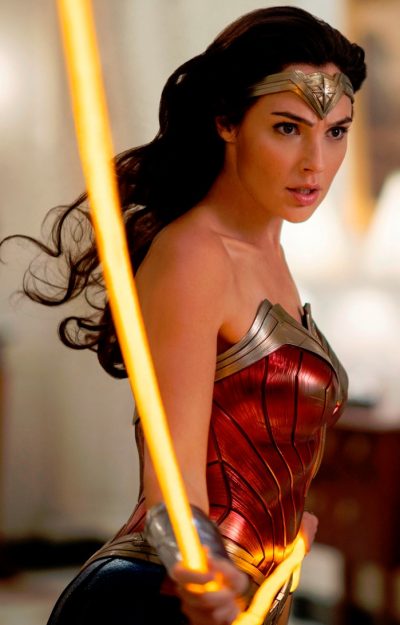 Gadot is still very good, but there just isn’t anything close to the sense of passion which she brought to the character in Wonder Woman. Here, saving the world seems like a day job, rather than something done out of a fierce, unbreakable conviction. The action sequences are merely alright. There’s some surprisingly poor CGI (even on a non-cinema screen), and they often seem short on physicality, with a couple of exceptions. A battle between WW and Cheetah in the White House is well-assembled, and there’s an opening sequence depicting a young Diana taking part in the Amazon Games. If it were a series, I’d be watching every week – my money would be on American Ninja Warrior star, Jessie Graff, who plays one of the competitors. That was nice.
Gadot is still very good, but there just isn’t anything close to the sense of passion which she brought to the character in Wonder Woman. Here, saving the world seems like a day job, rather than something done out of a fierce, unbreakable conviction. The action sequences are merely alright. There’s some surprisingly poor CGI (even on a non-cinema screen), and they often seem short on physicality, with a couple of exceptions. A battle between WW and Cheetah in the White House is well-assembled, and there’s an opening sequence depicting a young Diana taking part in the Amazon Games. If it were a series, I’d be watching every week – my money would be on American Ninja Warrior star, Jessie Graff, who plays one of the competitors. That was nice.
However, even this falls short, both in emotional and technical aspects, of the iconic “No Man’s Land” sequence. And thus we reach the crux of the issue: in just about every way, it’s not as good as the previous movie. That was a genuinely groundbreaking effort, in which everyone involved seemed fully invested, and which deserves to rank among the best of the new wave of comic adaptations, be they Marvel or DC. This tastes more like heavily generic comic-book fare, with a story too heavily reliant on convenient happenstance, supporting characters that distract rather than support, and a resolution that is not much more than a 21st-century version of Wonder Woman demanding, “Clap your hands if you believe in fairies.”
Philosophically, I was intrigued by her explicitly stating at one point, “I hate guns.” I recently finished The Boys, with its slew of malevolent superheroes. In that world, firearms were one of the few things that could level the playing field and give “normal” humans a chance. Guns are, simply, a great equalizer, and hearing the super-powerful express blanket disdain for them is… interesting. Similarly, we were expected to believe Barbara Ann is simultaneously so plain nobody sees her, yet can barely take two steps without getting creeped on. Look, I expect Wonder Woman to be pro-feminist. But a degree of consistency is apparently too much. For when given a wish for anything, the two lead women want a) to be hot, and b) their boyfriend back? I am woman, hear me… whine?
There are some positives. If not exactly period appropriate, Hans Zimmer’s score is effective and elevates a number of scenes. And the film does, at least, leave the audience on a positive note with a really lovely mid-credit sequence. However, it’s also telling that those 60 seconds are likely more impactful – and, certainly, more emotional engaging – than the other 150 minutes combined. It has been a long time since I’ve seen a sequel, with the same director and star, that has fallen so far short. Maybe The Matrix: Reloaded? All told, you would be better off just watching the trailer. It certainly provides a greater jolt of eighties energy than the movie has any apparent interest in delivering.
Dir: Patty Jenkins
Star: Gail Gadot, Pedro Pascal, Kristen Wiig, Chris Pine
 Turns out, interesting is not the same as good or entertaining. Who knew? If you watch this unaware, as I did, you are certainly going to be very, very confused initially. What’s important for you to know, is that the lead character is played by three completely different women (Lairana, Docampo and Ariza). This wasn’t because the first two died or anything: it’s a deliberate artistic choice, with the trio representing different aspects of her personality. It’s quite a trip, because they swap in and out between scenes as appropriate, or sometimes even during the same shot. There’s Lobo, the violent one; Rubia, the nymphomaniac; and Joven, who is shy and as close to normal as you’ll find here. You’ll understand why it took me a while to figure out what was going on.
Turns out, interesting is not the same as good or entertaining. Who knew? If you watch this unaware, as I did, you are certainly going to be very, very confused initially. What’s important for you to know, is that the lead character is played by three completely different women (Lairana, Docampo and Ariza). This wasn’t because the first two died or anything: it’s a deliberate artistic choice, with the trio representing different aspects of her personality. It’s quite a trip, because they swap in and out between scenes as appropriate, or sometimes even during the same shot. There’s Lobo, the violent one; Rubia, the nymphomaniac; and Joven, who is shy and as close to normal as you’ll find here. You’ll understand why it took me a while to figure out what was going on.






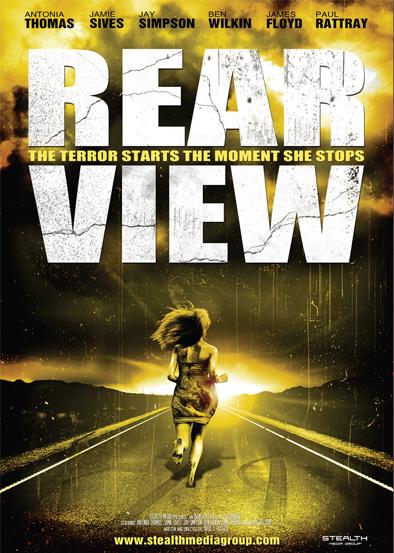 I must confess, I was perversely intrigued when I read a review on the IMDb, apparently from one of the directors, disowning this film: “Terrible, and despite it having my name on it, I had no say in the final cut.” While it is true to say that the synopsis – “Based on true events, a girl fights for her life on the Road – Tears Of Souls – chased by a gang of slave traffickers” – is almost entirely inaccurate, it’s not
I must confess, I was perversely intrigued when I read a review on the IMDb, apparently from one of the directors, disowning this film: “Terrible, and despite it having my name on it, I had no say in the final cut.” While it is true to say that the synopsis – “Based on true events, a girl fights for her life on the Road – Tears Of Souls – chased by a gang of slave traffickers” – is almost entirely inaccurate, it’s not 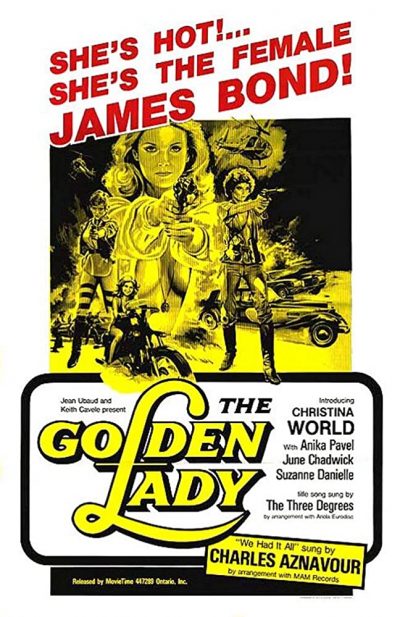 This British film occupies an odd middle ground between Ian Fleming and Jackie Collins – with a garnish of… The Village People? Yeah, there were points where I genuinely wondered what I’d strayed into. The titular female is Julia Hemingway (Skriver, under the rather laughable screen name of “Christina World”, which seems more like a dubious theme-park), who is a corporate espionage specialist. She accepts a commission to infiltrate the bidding for oil rights in a Middle Eastern country, on behalf of one of the four participants.
This British film occupies an odd middle ground between Ian Fleming and Jackie Collins – with a garnish of… The Village People? Yeah, there were points where I genuinely wondered what I’d strayed into. The titular female is Julia Hemingway (Skriver, under the rather laughable screen name of “Christina World”, which seems more like a dubious theme-park), who is a corporate espionage specialist. She accepts a commission to infiltrate the bidding for oil rights in a Middle Eastern country, on behalf of one of the four participants.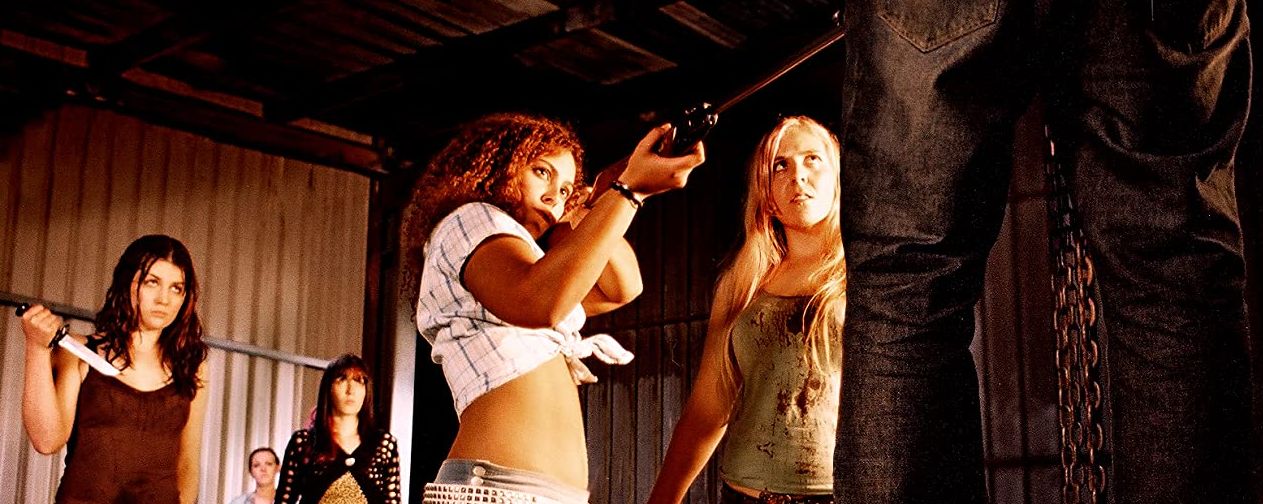 ★★★½
★★★½
 It’s weird what you stumble across on Amazon Prime. This is the feature-length version of a web series, originally made in 10 episodes. Just based on the title and description – “Delinquent girls are trained to perform risque but dangerous kung fu fight shows in a Las Vegas now owned and operated by the Chinese Mafia.” – I thought it best to wait until Chris was not around. Mostly because I’m not sure I could have stood the dripping sarcasm. Turns out, I needn’t have worried. Everyone remains attached to their clothes, and it’s resolutely PG-13 rated. Indeed, we actually see very little of the “risque” shows mentioned, which is a bit of a shame: the fragments we see, along with the training clips, suggest it’s something I’d love to attend in Vegas.
It’s weird what you stumble across on Amazon Prime. This is the feature-length version of a web series, originally made in 10 episodes. Just based on the title and description – “Delinquent girls are trained to perform risque but dangerous kung fu fight shows in a Las Vegas now owned and operated by the Chinese Mafia.” – I thought it best to wait until Chris was not around. Mostly because I’m not sure I could have stood the dripping sarcasm. Turns out, I needn’t have worried. Everyone remains attached to their clothes, and it’s resolutely PG-13 rated. Indeed, we actually see very little of the “risque” shows mentioned, which is a bit of a shame: the fragments we see, along with the training clips, suggest it’s something I’d love to attend in Vegas.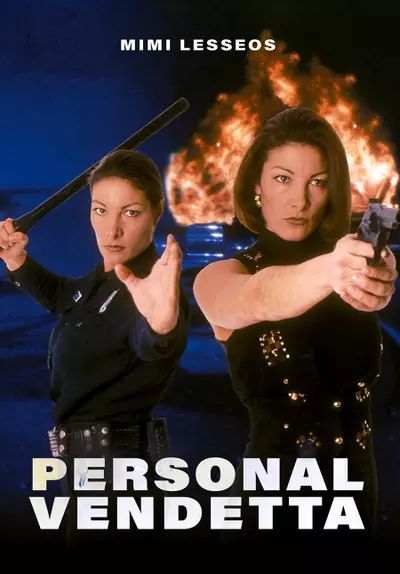 Bonnie Blackwell (Lesseos) is a battered wife, whose husband, Zach (Bottoms), eventually goes too far, putting her in hospital. He gets a spell in prison, and she decides to take control of her life and become a police officer. However, the scars of her abuse run deep, and she finds herself initially “freezing” when faced with potential threats, due to the PTSD resulting from her abusive relationship. Encouraged by colleague Bill Starr (Douglas), she eventually manages to work her way past that, just in time for Zach to be released from jail without her knowledge. She discovers that he had been running a human trafficking operation, bringing in Vietnamese mail-order brides, and sets out to take him down.
Bonnie Blackwell (Lesseos) is a battered wife, whose husband, Zach (Bottoms), eventually goes too far, putting her in hospital. He gets a spell in prison, and she decides to take control of her life and become a police officer. However, the scars of her abuse run deep, and she finds herself initially “freezing” when faced with potential threats, due to the PTSD resulting from her abusive relationship. Encouraged by colleague Bill Starr (Douglas), she eventually manages to work her way past that, just in time for Zach to be released from jail without her knowledge. She discovers that he had been running a human trafficking operation, bringing in Vietnamese mail-order brides, and sets out to take him down.
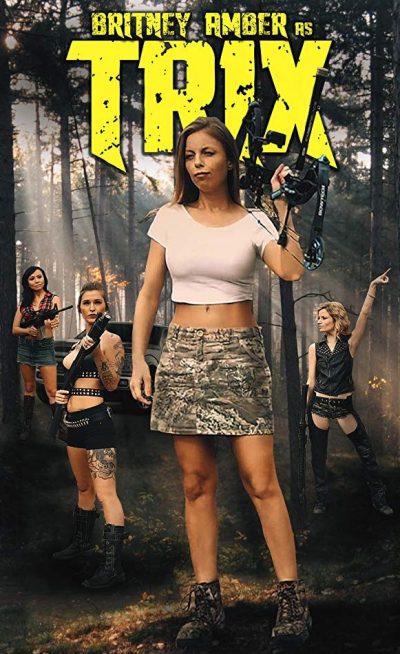 Maybe I’m getting too old for this kind of thing. Perhaps there was a time in my callow youth when I would have been grateful for the light-to-moderate amount of gratuitous nudity which this contains. Now, though? Its flaws overwhelm any such merits. Or maybe it was the fact that I watched this while dozed up to the eyeballs on DayQuil, and frankly, coughing up phlegm proved to be a more satisfactory pursuit.
Maybe I’m getting too old for this kind of thing. Perhaps there was a time in my callow youth when I would have been grateful for the light-to-moderate amount of gratuitous nudity which this contains. Now, though? Its flaws overwhelm any such merits. Or maybe it was the fact that I watched this while dozed up to the eyeballs on DayQuil, and frankly, coughing up phlegm proved to be a more satisfactory pursuit.